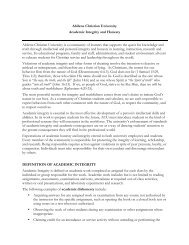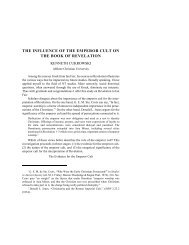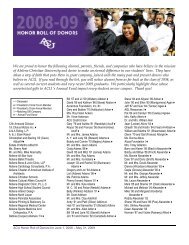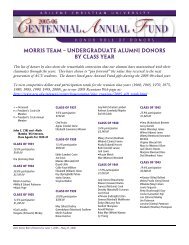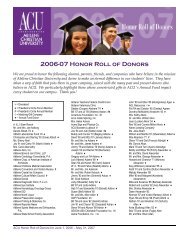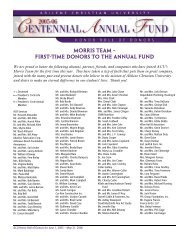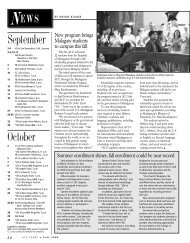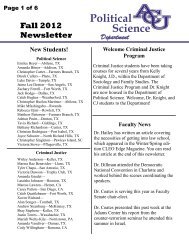pacifism in churches of christ in western canada during world
pacifism in churches of christ in western canada during world
pacifism in churches of christ in western canada during world
You also want an ePaper? Increase the reach of your titles
YUMPU automatically turns print PDFs into web optimized ePapers that Google loves.
212 RESTORATION QUARTERLY<br />
3<br />
Canada, and the <strong>in</strong>fluence <strong>of</strong> David Lipscomb fed the stream <strong>of</strong> <strong>pacifism</strong> <strong>in</strong> the<br />
4<br />
west. This paper will explore <strong>pacifism</strong> <strong>in</strong> <strong>western</strong> Canada through the pages <strong>of</strong><br />
the (Canadian) Gospel Herald and trace its connections to Nashville Bible<br />
School.<br />
Nashville Bible School<br />
Nashville Bible School was established <strong>in</strong> 1891 by David Lipscomb and<br />
James A. Hard<strong>in</strong>g <strong>in</strong> Nashville, Tennessee. It was a liberal arts college that<br />
required daily Bible study as part <strong>of</strong> the curriculum. Follow<strong>in</strong>g the death <strong>of</strong><br />
Lipscomb <strong>in</strong> 1917, the name <strong>of</strong> the school was changed to David Lipscomb<br />
5<br />
College. In 1901, Hard<strong>in</strong>g left Nashville Bible School to establish Potter Bible<br />
School <strong>in</strong> Bowl<strong>in</strong>g Green, Kentucky, and through the work <strong>of</strong> his students<br />
<strong>in</strong>fluenced the establishment <strong>of</strong> numerous Bible schools. Hard<strong>in</strong>g was considered<br />
the father <strong>of</strong> the Bible school movement among Churches <strong>of</strong> Christ, while<br />
Lipscomb was considered the father <strong>of</strong> the southern Churches <strong>of</strong> Christ. 6<br />
Foundational to the theology <strong>of</strong> Nashville Bible School is, what Richard<br />
Hughes has called, the “apocalyptic” <strong>world</strong>view. This <strong>world</strong>view is not neces-<br />
7<br />
sarily connected to theories regard<strong>in</strong>g “end times,” but is a <strong>world</strong>view based<br />
upon a k<strong>in</strong>gdom theology. It emphasizes Christian citizenship <strong>in</strong> a heavenly<br />
k<strong>in</strong>gdom, not an earthly one.<br />
One who holds to an apocalyptic orientation takes very seriously the promise<br />
<strong>of</strong> the end <strong>of</strong> this age and the assurance that the K<strong>in</strong>gdom <strong>of</strong> God will f<strong>in</strong>ally<br />
triumph. But more than that, he or she seeks to live his or her life as if the<br />
f<strong>in</strong>al triumph <strong>of</strong> the K<strong>in</strong>gdom <strong>of</strong> God were complete. For one who ascribes<br />
to this perspective, the K<strong>in</strong>gdom <strong>of</strong> God is not someth<strong>in</strong>g far <strong>of</strong>f <strong>in</strong> the<br />
future. Rather, the K<strong>in</strong>gdom <strong>of</strong> God is the def<strong>in</strong><strong>in</strong>g presence, the only reality<br />
that matters. 8<br />
Commitment to an apocalyptic <strong>world</strong>view calls for radical discipleship on<br />
the part <strong>of</strong> Christians. They are called to be non-materialistic, to m<strong>in</strong>ister to the<br />
3 Claude Cox, “The Division between Disciples and Churches <strong>of</strong> Christ <strong>in</strong> the<br />
Disciples Church at Meaford, Ontario,” ResQ 27, no.1 (Jan. 1984): 34.<br />
4 Lynn Anderson, email to author, 6 Dec. 2005; John Bailey, email to author, 20<br />
Nov. 2005.<br />
5 Robert E. Hooper, “Lipscomb University,” <strong>in</strong> The Encyclopedia <strong>of</strong> the Stone-<br />
Campbell Movement (eds. Douglas A. Foster, Paul M. Blowers, Anthony L. Dunnavant,<br />
D. Newell Williams; Grand Rapids: Eerdmans, 2004), 482–83.<br />
6 John Mark Hicks and Bobby Valent<strong>in</strong>e, K<strong>in</strong>gdom Come: Embrac<strong>in</strong>g the Spiritual<br />
Legacy <strong>of</strong> David Lipscomb and James Hard<strong>in</strong>g (Abilene: Leafwood, 2006), 21–22.<br />
7 Richard T. Hughes, Reviv<strong>in</strong>g the Ancient Faith: The Story <strong>of</strong> Churches <strong>of</strong> Christ<br />
<strong>in</strong> America (Grand Rapids: Eerdmans, 1996), 92.<br />
8 Richard T. Hughes, Reclaim<strong>in</strong>g a Heritage: Reflections on the Heart, Soul and<br />
Future <strong>of</strong> Churches <strong>of</strong> Christ (Abilene: ACU Press, 2002), 73.



